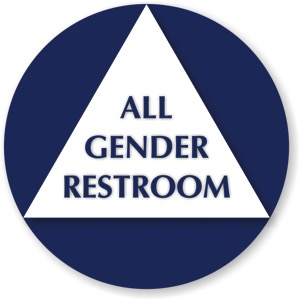
Jonathan Alexandre, the legal counsel to the Massachusetts Family Institute recently summed up the socially conservative Christian position on equal rights for transgender people in a single phrase. “It’s about bathrooms,” he wrote in an op-ed for the Boston Globe.
Massachusetts is a state that this year is considering a statewide bill that would extend public accommodation protections to transgender people. Equality legislation that affords public accommodations protections is about a person being able to go to a private business that serves the public, or a government-owned or operated facility that serves the public, and not be turned away.
Although this protection does include public bathrooms, the protection also includes being able to buy a hamburger and a cup of coffee at a diner and not hear the words “we don’t serve your kind here” as a number of my transgender friends have actually heard.
In his June 3, 1964 speech at Arizona State University, Martin Luther King Jr. identified public accommodation protections as necessary, stating, “Every state and every community should have a public accommodations bill.”
In that same year, former President Franklin D. Roosevelt testified at the Senate Commerce Committee hearings for the federal Public Accommodations Bill, and in a back-and-forth with Sen. Strom Thurmond stated, “I believe that if a man goes into a business which holds itself out as rendering service to the general public, he has an obligation to serve the general public regardless of whether the individual be a Jew, a Catholic, a Puerto Rican, a Negro, a white, Protestant or anything else. I think that as long as he is a citizen and comes under the constitutional rights of our country, then in my opinion – this is obviously a difference between us – I believe property rights are secondary to human rights.”
In Massachusetts, the “bathroom bill” arguments are over a bill affording transgender people public accommodation protections. In seven other states, the “bathroom bill” arguments are for bills denying transgender people access to public bathrooms in publicly and privately owned places in alignment with their gender identities.
The tactic used in these seven states was the one used by the socially conservative Christian community in Houston in 2015 against the Houston Equal Rights Ordinance (HERO). In an ad to defeat the referendum on HERO, a television commercial falsely tied transgender people to bathroom predation by child rapists. The ad didn’t state that transgender women would be the rapists, but instead indicated that granting public accommodation protections to transgender women would legally sanction rapists entering women’s public bathrooms by men claiming to be transgender.
This is a lie. There’s a direct parallel: a similar ad was produced for a similar ordinance and (failed) referendum in Gainesville, Fla. in 2008, and per an email exchange with Media Matters, the Gainesville Police Department spokesman reported that in the seven-plus years since the Gainesville ordinance became law the department could not recall any incidents related to the city’s LGBT protections.
The kind of lying we see and hear is ungodly. A trans person isn’t an object: he, she, or they must be dealt with as a person sacred unto themselves, not as an animated tool to create a false narrative. To do otherwise is to depersonalize the person, and to desecrate who that person is as a fully human being. In a spiritual sense, as long as any transgender person is treated as a means to an end because they are a member of an oppressed group, the image of God within that transgender person is abused, and consequentially their humanity is lost to the sight of those who inflict that abuse.
“It’s about bathrooms” is what the inhumane oppressors of transgender people are saying to obscure transgender people’s humanity. This, at a time when we just know “every community should have a public accommodations bill.”











